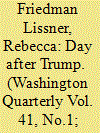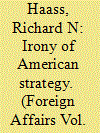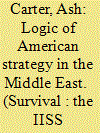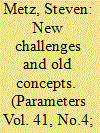| Srl | Item |
| 1 |
ID:
170881


|
|
|
| 2 |
ID:
159262


|
|
|
| 3 |
ID:
107333


|
|
|
| 4 |
ID:
126752


|
|
|
|
|
| Publication |
2013.
|
| Summary/Abstract |
America's strategy has become increasingly budget-driven in the face of ongoing cuts, culminating in the sequester. As a result, fewer funds are, and will be, available for critical operations, notably exercises and training with foreign forces that are the key both to strengthening alliances and partnerships and to deterring current and potential adversaries. That Washington continues to revise its defense strategy virtually on an annual basis has further undermined its credibility worldwide. Given its long-standing global interests, and uncertainty regarding when and where it might again have to commit forces to defend them, the United States must reinvigorate its efforts to streamline the Defense Department so as to maintain its global posture in the face of budget pressures. Measures to improve defense efficiency include reductions in the civilian and contractor work forces, overhaul of the military medical and retirement systems, and repeal of anachronistic laws that foster waste in defense acquisition.
|
|
|
|
|
|
|
|
|
|
|
|
|
|
|
|
| 5 |
ID:
118310


|
|
|
|
|
| Publication |
2013.
|
| Summary/Abstract |
Many commentators now contend that America's power is in relative or absolute decline. However, Declinists overstate their argument, as America has both a commanding amount of residual power and many enduring strengths. Decline, absolute or relative, is not predetermined. However, retaining our influence and preserving our ability to protect and advance U.S. interests does require addressing key shortfalls in strategic priorities to ensure synergies among the components of U.S. national power. A variety of strategies- particularly Offshore Balancing- have been offered to better balance ends, ways and means. These alternatives suffer from policy, historical and implementation challenges. A hybrid solution, Forward Partnering, avoids these deficiencies and is presented as an alternative grand strategy.
|
|
|
|
|
|
|
|
|
|
|
|
|
|
|
|
| 6 |
ID:
067347


|
|
|
|
|
| Publication |
London, Her Majestry's Stationary Office, 1964.
|
| Description |
xv, 401p.Hbk
|
| Series |
United Kingdom Military Series
|
| Contents |
Vol.III: June 1941-August 1942
|
|
|
|
|
|
|
|
|
|
|
|
Copies: C:1/I:0,R:0,Q:0
Circulation
| Accession# | Call# | Current Location | Status | Policy | Location |
| 009221 | 940.53/GWY 009221 | Main | On Shelf | General | |
|
|
|
|
| 7 |
ID:
119661


|
|
|
|
|
| Publication |
2013.
|
| Summary/Abstract |
A decade ago, when the wars in Afghanistan and Iraq began, the United States chose to immerse itself in the greater Middle East when it had little reason to dive in. But now that most Americans want little to do with the region, U.S. officials are finding it difficult to turn away.
|
|
|
|
|
|
|
|
|
|
|
|
|
|
|
|
| 8 |
ID:
151606


|
|
|
|
|
| Summary/Abstract |
The Department of Defense remains engaged in the Middle East because doing so serves both America’s interests and those of its regional allies and partners.
|
|
|
|
|
|
|
|
|
|
|
|
|
|
|
|
| 9 |
ID:
114723


|
|
|
| 10 |
ID:
143499


|
|
|
|
|
| Publication |
London, Chatto and Windus, 1969.
|
| Description |
208p.hbk
|
| Standard Number |
701114900
|
|
|
|
|
|
|
|
|
|
|
|
Copies: C:1/I:0,R:0,Q:0
Circulation
| Accession# | Call# | Current Location | Status | Policy | Location |
| 003859 | 959.7043/THO 003859 | Main | On Shelf | General | |
|
|
|
|
| 11 |
ID:
128136


|
|
|
|
|
| Publication |
2013.
|
| Summary/Abstract |
On November 26, 2011 Glenn Grenwald wrote an article in Salon magazine, a widely read American online publication, about a vast neoconservative plan to re-engineer the entire Middle East and North Africa region, in the aftermath of the collapse of the Soviet Union and the Warsaw pact in the early 1990s.
|
|
|
|
|
|
|
|
|
|
|
|
|
|
|
|
| 12 |
ID:
130265


|
|
|
|
|
| Publication |
2013.
|
| Summary/Abstract |
Two years into the wave of upheaval sweeping the Arab world, new regional dynamics have become clearer, as have unresolved tensions in current U.S. policy toward the region. Given the scale and velocity of political turmoil associated with the Arab uprisings, the Obama administration has understandably adopted a largely reactive approach, attempting to adjust U.S. policies to a rapidly changing environment. It has been more successful in those efforts than is commonly recognized, maintaining effective pressure against Iran and al-Qaeda while helping to broker meaningful political transitions in Tunisia, Egypt, Yemen, and Libya. But now there is a sense of drift overtaking American strategy for the region. The time has come for the Obama administration to articulate a more coherent, overarching, positive agenda for the new Middle East.
|
|
|
|
|
|
|
|
|
|
|
|
|
|
|
|